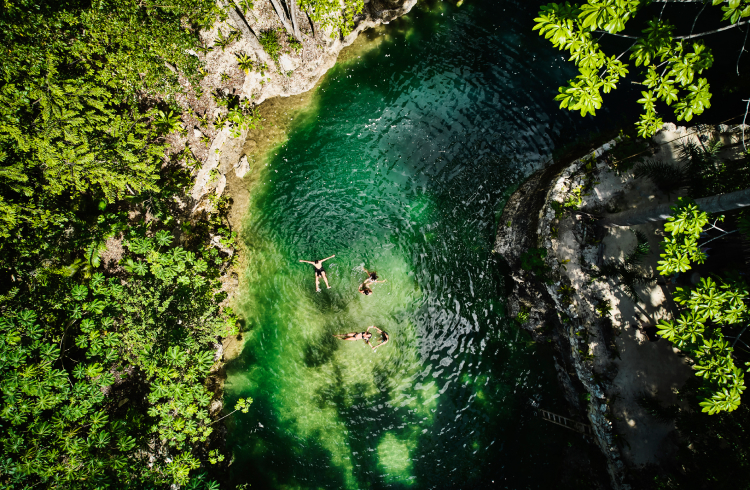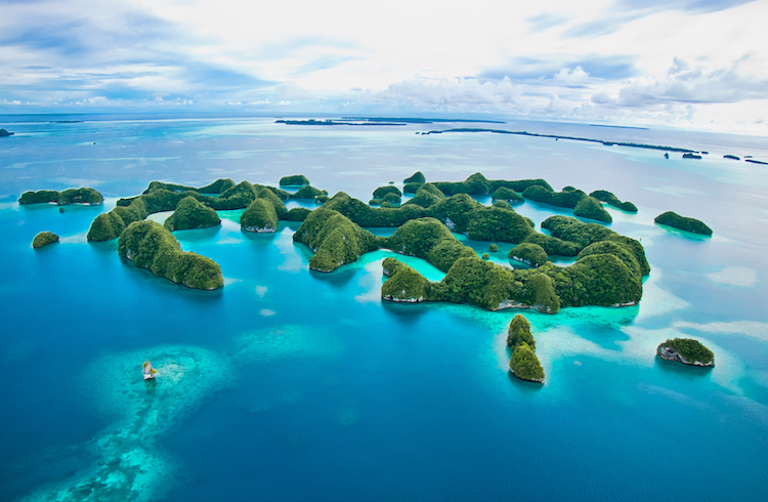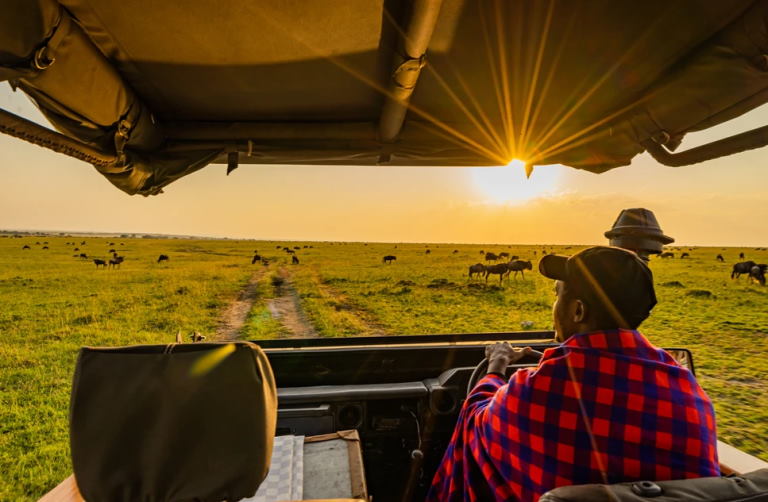The Travel Sustainability Conferences Changing the World
The responsible travel train has well and truly left the station, but these organizations are doing more than talking about change – they’re making it happen.
 Photo © Getty Images / Yagi Studio
Photo © Getty Images / Yagi Studio
- How to beat greenwashing
- The United Nations Climate Change Conference
- IMPACT Sustainability, Travel, and Tourism Conference
- SYNERGY and The Retreat Show
- Regenerative Travel Earth Day Summit 2023
- Green Destinations
- Our Ocean
“Tourism is a truly global force that in and of itself has the power to effect change,” remarked Robert Sandford, leading Canadian expert on sustainability in his opening speech at this year’s IMPACT Sustainability, Travel, and Tourism Conference. IMPACT is a yearly summit that takes place in Victoria, British Columbia, Canada every January. “It’s up to tourism everywhere to alert people of the beautiful world we live in that we are at risk of losing if we don’t act now.”
The buzz around responsible tourism is growing louder by the day. Conversations around topics such as regenerative tourism have an increasingly significant voice. Putting these changes into practice is a different story, however. The rise of sustainable travel as a trend is watering down actionable change; the changes that need to happen to get ahead of the climate crisis and to make the travel industry a more equitable and inclusive space.
How to beat greenwashing
One of the biggest challenges to arise amidst the buzz is greenwashing, a tactic of conveying misleading information about an entity’s environmentally sound practices. The vision of responsible tourism isn’t simply about hotels running off of 50% renewable energy, businesses buying credit to offset their carbon emissions, and establishments banning single-use plastic. Not to discount these efforts, but individually they’re insufficient and can detract attention from the real work that needs to take place.
International conferences at the confluence of climate action and responsible tourism have become formidable spaces to leverage substantial change in the industry and have the power to become even more so. By bringing together experts from many industries, these conferences host immersive experiences in intentionally chosen destinations, feature keynote speakers on crucial topics, and facilitate breakout sessions that can critically address the gaps in the industry and lay the groundwork for future change.
The United Nations Climate Change Conference
Also known as COP, The United Nations Climate Change Conference, is perhaps the most well-recognized global conference on climate concerns. COP26, held in Glasgow in 2021, exclusively focused on sustainable tourism. While the conference aimed to build on past successes and set the foundation for future action, it fell short. Instead, COP26 became a lesson in the gap between conversation and action.
In the 2022 Emissions Gap Report, Inger Anderson, Under-Secretary-General of the United Nations and Executive Director of the UN Environment Programme, commented: “At the Glasgow climate summit last year, countries committed to updating their climate pledges to deliver far greater emissions cuts. The Gap report documents that, collectively, the limited number of updated pledges shave less than 1 percent off projected greenhouse gas emissions in 2030. This is completely insufficient. We need to cut 45 percent off emissions by 2030, over and above what current policies will deliver, to get on track to limiting global warming to 1.5°C.”
Anderson isn’t alone in her assertion that COP26 failed to deliver what it promised. Both the climate world and the travel industry, and the intersection of the two, are muddled by conversations and trendy initiatives that lack action. In recent years, there has been a rise of small, focused conferences that are asking difficult questions and putting in the hard work to map out a plan to help countries, businesses, and environmental areas reach these goals. Goals that aren’t just a suggestion but that are necessary to get ahead of the global climate crisis and include all communities as part of the conversation, so the world doesn’t reach a tipping point from which there is no return, a point which we’re approaching at full speed.
IMPACT Sustainability, Travel, and Tourism Conference
IMPACT lies at the intersection of environmental sustainability and tourism and is dedicated to laying out a detailed plan to get ahead of the climate crisis by 2030. While IMPACT’s focus lies predominantly in Canada, travel industry leaders from around the world congregate to learn, share, and discuss fundamental topics in responsible tourism and the overarching lessons are universally relevant. One of the biggest takeaways from the four-day conference: the tourism industry needs to take the climate warnings seriously, which involves laying out and following an action-oriented plan that will lower global temperatures.
Before entering the conference rooms, IMPACT opens with a Day of Impact. Participants experience firsthand the changes and green initiatives stirring in Victoria, which recently became the first North American urban destination to receive a Biosphere certification. The harbor city is abundant in carbon-conscious hotels and farm-to-table eateries celebrating the bounties of local farmers. I flew over the pine-studded hills and deep blue waters of Vancouver Island on Harbour Air, a seaplane company set to become the first commercial airline to go fully electric. We cruised along the Salish Sea aboard an Eagle Wing boat, a carbon-neutral establishment that equips its boats with ultra-silent engines to not disturb marine life. Individuals from the Lekwungen First Nation welcomed us to their ancestral land and spoke about the importance of conserving it while we sailed through Sea Forest, a floating kelp farm dedicated to sustainable aquaculture practices.
With a newfound appreciation for witnessing responsible tourism in action, we gathered inside the eco-conscious Victoria Conference Centre for three days of workshops and breakout discussions. Speakers from across British Columbia and Canada sparked crucial conversations and laid out actionable plans. From major names in the travel industry like Intrepid Travel and the Marriott Hotels, to local initiatives such as GeaZone and SHARC Energy, topics around hemp and other sustainable building materials, hydrogen vehicles, indigenous tourism, and responsible communication took center stage.

SYNERGY – The Retreat Show
Wellness-based travel retreats are in the unique position to shape tourism for the better, though until recently haven’t capitalized on their potential. Inspired by her love for travel and the deep impact wellness experiences had on her life and the vision to blend the two, Laura Montesanti founded Synergy. “For me, travel was a healing tool,” she reflected. “It’s a shame that the industry doesn’t have more healing tools available for individuals when they’re traveling, to use the resources around them. Go on a mindful walk in the forest while guided through a meditation, for example.”
Synergy – The Retreat Show blends slow travel and sustainability through consciously curated wellness experiences. At this annual international conference, hotels, buyers, and wellness professionals converge in an intimate, intentional space and focus on the creation of retreats that are as impactful for guests as they are for local communities and the environment. Over three days, the intimate group exchanges ideas and knowledge participates in immersive wellness experiences and inspires the future of wellness retreat travel.
The locations are carefully chosen to connect with a destination well-positioned for wellness travel. The Retreat Show’s second iteration will take place in October 2023 on the Riviera Maya in Mexico and will draw on many elements of Mayan culture. Balance was an important element of Mayan culture so the theme of “balance” will be woven throughout the conference, encouraging participants to reflect on how they can bring balance into their lives and the role it plays in sustainability.
Each unique detail of Synergy is a reflection of Laura’s background in tourism, wellness, and yoga. For her, wellness extends far beyond a spa, it includes immersive travel, sustainability, and community connection, including volunteering. Laura advocates for how much more we can do and experience while traveling by connecting travelers in the right spaces and to the right people. And Synergy strives to accomplish just that: to inspire individuals in the industry to take action, to include wellness as part of their experience, and to understand the concrete impact they can have in community and environmental sustainability while traveling.
Regenerative Travel Earth Day Summit 2023
In honor of Earth Day on 18 April 2023, Regenerative Travel hosted a summit in Brooklyn, New York. Regenerative Travel was founded with the intention of creating a community of action-oriented spaces and changemakers in the travel industry dedicated to eco-friendly tourism. The vision? Developing a portfolio of hotels that regenerate people and places through innovation, creativity, and lifting up underrepresented groups. Regenerative Travel’s single-+day summit packed in a lot of information featuring speakers addressing crucial topics. Topics included regenerative safaris in remote, off-grid camps; developing regenerative leadership in teams; and the importance of stewardship and educational opportunities in the travel industry.
Green Destinations
A non-profit dedicated to destination development and certification, Green Destinations is guiding cities and towns to operate more sustainably. The organization supports destinations, alongside their businesses and communities, with training programs. Green Destinations also offers a range of certifications that destinations can achieve through specific tools and parameters that verify their sustainable practices. Each year, Green Destinations hosts a summit in one of their certified destinations. This year’s summit will take place in Tallinn, Estonia, named the European Green Capital of 2023. Over the course of the summit, travel industry professionals come together to attend workshops tackling timely topics and collectively explore challenges and exchange potential solutions. The ultimate goal? To achieve collective, holistic, and sustainable growth in the tourism industry.
Our Ocean
Our Ocean is an international conference exclusively focused on marine conservation. The eighth annual conference was held in Panama in March, where marine pollution, ecological connectivity, and sustainable tourism were among the primary focuses. Governments, civil society, scientists, and experts in the field came together to tackle the biggest challenges facing the ocean through uniting knowledge, technology, and finance. The creation of Marine Protection Areas was one priority, which can play an important role in the management and conservation of ocean biodiversity. Blue economies were another priority, meaning developing economic systems that conserve marine systems while using oceans and their resources in sustainable ways for economic growth. Finally, joint efforts to solve marine pollution—from raising awareness around ocean conservation to taking preventative and corrective action to clean the ocean, took center stage.
Related articles
Simple and flexible travel insurance
You can buy at home or while traveling, and claim online from anywhere in the world. With 150+ adventure activities covered and 24/7 emergency assistance.
Get a quote


No Comments